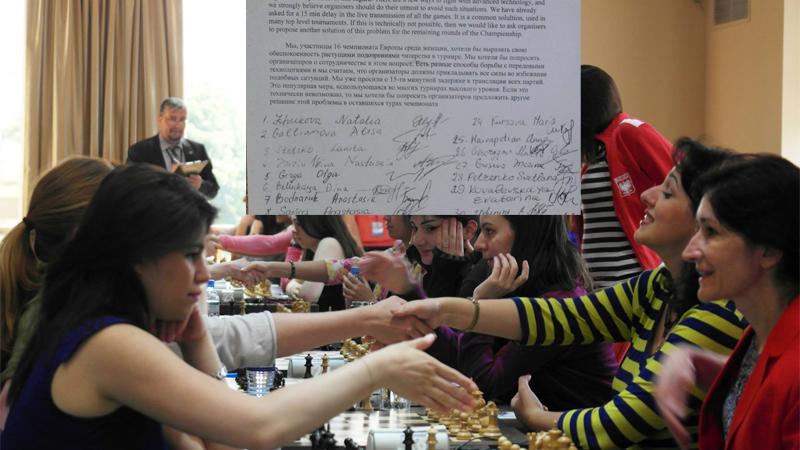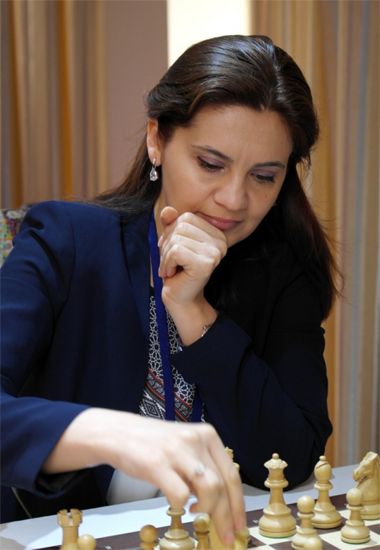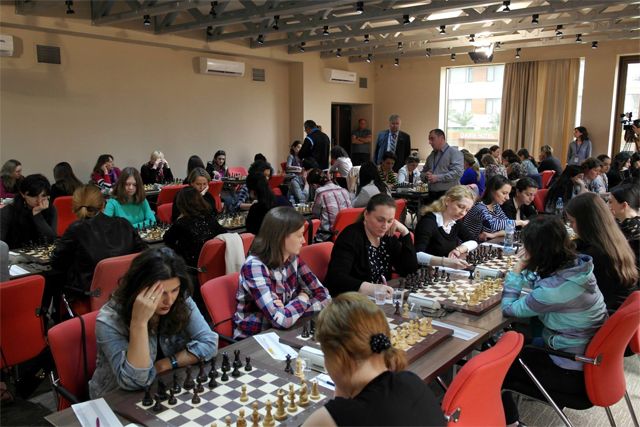
Cheating Controversy At European Women's Championship (Updated)
A surprisingly good result by one of the players at the European Women's Championship has caused a cheating controversy after the organizers granted a request from players to delay the transmission of the live games.
The European Women's Championship is well under way in Chakvi, Georgia. With two rounds to go IM Nino Batsiashvili is half a point ahead of GM Natalia Zhukova of Ukraine, but it's not the chess that's being talked about.
WGM Mihaela Sandu, a 38-year-old player from Romania, caught all the attention when she started with 5.0/5, beating Aysel Mammadova (1862), IM Salome Melia (2452), WGM Aleksandra Goryachkina (2474), WGM Olga Girya (2479) and IM Lela Javakhishvili (2472).

WGM Mihaela Sandu. | Photo: Fiona Steil-Antoni.
Here's one of her wins. You can download all games from the tournament in PGN here (via TWIC).
The top 35 boards in Chakvi are being transmitted live on the internet. However, due to technical problems, in round six, the two top boards were transmitted with a delay. In that round, Sandu lost to Nino Batsiashvili (2473).
The next day her game transmission wasn't delayed, and she won again. Her opponent was ex-world champion Antoaneta Stefanova (2512).
At that point many players must have thought: this isn't a coincidence anymore. On the rest day they gathered, and wrote not one, but two letters to the organizers.
The first, signed by 32 players (98 players participate in Chakvi), had the following text in both English and Russian:
“We, the participants of the 16th European Women Championship would like to express our grave concern regarding raising suspicions of cheating in the tournament. We would like to ask organisers['] cooperation in this regard. There are a few ways to fight with advanced technology, and we strongly believe organisers should do their utmost to avoid such situations. We have already asked for a 15 min delay in the live transmission of all games. It is a common solution, used in many top level tournaments. If it is technically not possible, then we would like to ask organisers to propose another solution of this problem for the remaining rounds of the Championship.”
The second letter (which might have been created first) was signed by only 15 players, and was more specific:
“We, participants of the 16th European Individual Women Championship, want to express concern about the situation with M.Sandu's performance. We would like to ask organisers not to include her games from the rounds 8-11 in a live transmission and publish them after the rounds. We do not see any important reason to dislike this precautionary measure for both sides. We hope that such a decision will prevent all the possible suspicions.”
Both letters were put up on a bulletin board. Click for a bigger version.
Transmitting games with a delay is a typical measure to prevent any possible outside helpers to have access to the actual moves in real time. However, it isn't common at all at top tournaments; only in Dortmund this is done. All other super tournaments transmit their games in real time.
Stefan Koth, organizer of the Sparkassen Chess Meeting in Dortmund, told Chess.com: “Since our tournament starts exactly at 15:15 online, is free of charge and runs without any further delay, I don't see the 15-minute delay as a sacrifice to the fans.”
The organizers decided to grant the request, even though the tournament was already more than half way done. Rounds eight and nine were transmitted with delay. Sandu lost to both Natalia Zhukova (2456) and Elina Danielian (2458).

The European Championship under way in Chakvi, Georgia. | Photo: Fiona Steil-Antoni.
In a response letter to the players, tournament director Giorgi Giorgadze wrote:
“We are sure, that such a solution is a right way to avoid any suspicion of cheating, in general. But we don't share concerns of ‘rising suspicions of cheating’ in this tournament.”
A recent cheating case in India, where an amateur player communicated with a friend more than 200km away about a game that was not transmitted live on the internet, once again made clear that a 15-minute delay of transmission doesn't rule out cheating altogether.
Giorgadze also responded to the second letter, saying that the organizers do not agree:
“After consultation with arbiters and also with grandmasters, organisers are sure, that there is not any particular reason not to transmit the games of Mrs. Sandu. Grandmasters have checked her games with different programs and did not find any use of computer help during the game.“

The response letter from the organizers.
Giorgadze continued:
“We consider this accusation as unfair, insulting and creating some psychological pressure. We think that both letters should be seriously discussed in ECU to find the right way to protect players from advanved technology, so that not a single chessplayer is put under psychological pressure or undeserved insult.
Organisers ask those 15 players to show their respect to their colleague and to withdraw their signatures.”
Giorgadze points out that the tournament is played under the FIDE Laws of Chess which currently include anti-cheating measures; for example it is forbidden to bring a mobile phone to the venue. He ends his letter with:
“[I]n case of a false accusation you may be penalized by the arbiter according to Article 12.2 and 12.9 of the Laws of Chess (from warning to expulsion from the competition).”
Meanwhile, the Romanian Chess Federation has reacted to the matter. In a letter to the organizers, RCF General Secretary Vladimir Danilov asks them “to observe strictly the FIDE Anti Cheating Regulations and FIDE Ethics rules.”
“In this particular case, it is clear when a Cheating Complaint, without any evidence or clue, was forwarded in the stage when Mihaela Sandu was leading the tournament, that a big pressure was put on her. (...) The Romanian Chess Federation (RCF) states that Mihaela Sandu had a irreprochable fair play attitude during all her chess career and express its will to support and protect Mihaela Sandu against any breach of Anti Cheating or Ethics rules (...).”

The letter from Mr Danilov (not to be confused with Silvio Danailov).
Tomasz Delega, the chief arbiter of the tournament, told Chess.com that certain anti-cheating measures have been taken in Chakvi: “We have security staff with metal detectors, two persons for each round, so players are controlled at the entrance to the playing venue. Security staff also check all toilets before the round.
“We have one arbiter per six boards so arbiters can easily observe players, for example how many times one player went to the toilet. Regarding to Mrs. Sandu for example I didn't see any suspicious in her behavior during the play. She is sitting at the chessboard and thinking, she rarely goes out from the playing hall.”
FIDE's Anti Cheating Commission not only has set up regulations to prevent cheating, but also created a framework against witch hunting. In its Anti-Cheating Guidelines (in PDF here), the following sections are relevant:
3A If the complaint is manifestly unfounded (i .e ., not based on substantial evidence), the complainant can receive a warning by the ACC, whereupon his/her name will be added to a special “Warning database” maintained by the ACC . Upon receiving a second warning within a period of six months, the complainant shall be sanctioned (three months suspension for first violation, six months suspension for further violations).
6.6 6 . How to deal with accusations:
- The procedure for handling accusations is described under Section 3, Part A . If any FIDE-identified person presents an accusation of breach of AC regulations, the arbiter should ask him/her to make an official In-Tournament Complaint. In case of refusal, the arbiter shall make a remark in the tournament report and annotate the person’s name as having presented an accusation of breach of AC regulations. In this case the accused player shall not be informed by the arbiter. An arbiter who receives an In-Tournament Complaint may inform the accused player after the end of his/her game, and ask him/her for comment.
- The arbiter should describe in the tournament report any In-Tournament Complaints and inspections, stating the result of each action.
6.7 . How to deal with false accusations:
- In case of a false accusation by a player, the Arbiter shall penalize him/her according to Article 12.2 of the Laws of Chess. (...)
ACC Secretary Yuri Garrett told Chess.com: “The case is definitely worth considering and there are preliminary talks going on at the ACC level. Nothing formal yet, but definitely a discussion is going on, which may lead to a deeper investigation.
“Protecting players should be the main interest of FIDE's ACC, whether they are the victims of cheating incidents or they are the victims of witch-hunting. This is clearly reflected in our regulations and we will act accordingly.”
The case in Chakvi is a sign of the times. Chess has seen many cheating incidents in recent years, and as a result it's almost impossible for a player to score much better than his rating without being suspected of cheating.
At the Elista world championship in 2006, Vladimir Kramnik visited the toilet dozens of times during his games with Veselin Topalov. Topalov and his manager Silvio Danailov accused Kramnik of cheating, but their allegations backfired: evidence of computer assistance was never found, and many chess fans turned against the Bulgarians.
In 2009, at the Aeroflot Open, Shakhryar Mamedyarov lost to Igor Kurnosov in just 21 moves. The Azerbaijani GM publicly accused his opponent of cheating and decided to withdraw from the tournament. Evidence was never found, and Mamedyarov was ridiculed for not believing his opponent could find such strong moves.
Update: Chess-News has published a letter by Sandu in which she responds to the organizers with a written complaint:




